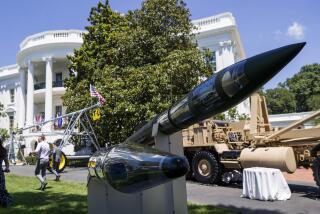Pentagon to Protect Troops Against Enhanced Terrorist Threat
- Share via
WASHINGTON — The Pentagon said Wednesday that it is developing emergency plans--likely to cost billions of dollars--to protect U.S. troops abroad against new kinds of terrorist attacks, ranging from large truck bombs to chemical and biological weapons.
Defense Department officials said the measures, some of which could be in place in as little as eight weeks, will involve fundamental changes in the way the military deploys its troops and secures its bases in several hot spots from Bosnia-Herzegovina to the Middle East.
The Pentagon’s intention to upgrade security for U.S. troops overseas was outlined to senators Wednesday morning by Defense Secretary William J. Perry and was discussed with reporters later by a senior defense official.
Perry also said that within a few weeks the Pentagon will begin to carry out its previously announced plan to relocate as many as 4,000 U.S. troops in Saudi Arabia from Riyadh and Dhahran to the remote Al Kharj air base 60 miles south of Riyadh, the capital, where they can be protected more easily.
Defense officials said the department decided to heighten security protection for U.S. troops stationed abroad because terrorists have begun using larger, more sophisticated weapons and are more fanatical today--that is, more willing to risk death themselves.
Although the Pentagon was caught unprepared by the size of the 5,000-pound bomb used in last month’s Dhahran truck bombing that killed 19 U.S. airmen, Perry said that intelligence reports suggest terrorists could use bombs as large as 10,000 pounds or 20,000 pounds and use chemical and biological weapons as well.
“We cannot deal with those attacks adequately just by moving fences and just by putting more Mylar on glass,” Perry told reporters Wednesday, referring to the kinds of small changes that already have been made at U.S. compounds in Saudi Arabia.
“I believe we have to get ahead of the threat assessment,” Perry said. “We are modeling our force-protection initiatives on the assumption that such attacks will occur.”
The defense secretary gave no specifics on the kinds of changes he has in mind, and officials said none would be available until planners complete their initial proposals. But policymakers said they hope to begin making changes by the end of the summer.
Defense officials also declined to provide any figures on how much the overall plan will cost. However, a senior official conceded that the additional costs will be “substantial,” easily in the range of several billion dollars.
Officials said that at least part of the cost of moving the force is likely to be borne by the Saudi Arabian government and that the two sides are negotiating who will pay for what.
Officials said the changes will not be limited to Saudi Arabia and will affect U.S. troops in Bosnia, Turkey and possibly other areas where intelligence suggests that American forces could be in danger.
They also cautioned that despite outrage over last month’s bombing, the United States must not overreact and begin pulling its troops out of Saudi Arabia, because that could encourage more terrorism.
“Unfortunately, no matter what we do in the name of force protection, no matter how careful we are . . . there will be further attempts. . . . And in all probability, some of those attempts will succeed,” one senior official said.
However, he asserted, “we are not in Saudi Arabia primarily to defend the Saudis but to protect our own vital national interests”--including maintaining stability in the region and preventing the country’s vast oil fields from falling under the control of a hostile state.
U.S. officials said that the United States has about 6,000 troops in Saudi Arabia, including about 4,000 involved in enforcing a United Nations ban on Iraqi military flights over southern Iraq. The rest support U.S. naval forces, help Saudi troops and perform diplomatic functions.
The Pentagon has about 18,000 U.S. troops in Bosnia, helping to enforce the peace agreement there. And it has several thousand service personnel in Turkey.
Officials said about 3,000 to 4,000 of the troops now deployed in Riyadh and Dhahran will be moved to the Al Kharj base, which is still not completed. Other troops, such as those now training Saudi forces in Riyadh, will remain where they are.
Pentagon strategists have argued that moving the troops not only will ease the task of protecting them but will lower the profile of U.S. personnel.
More to Read
Sign up for Essential California
The most important California stories and recommendations in your inbox every morning.
You may occasionally receive promotional content from the Los Angeles Times.













